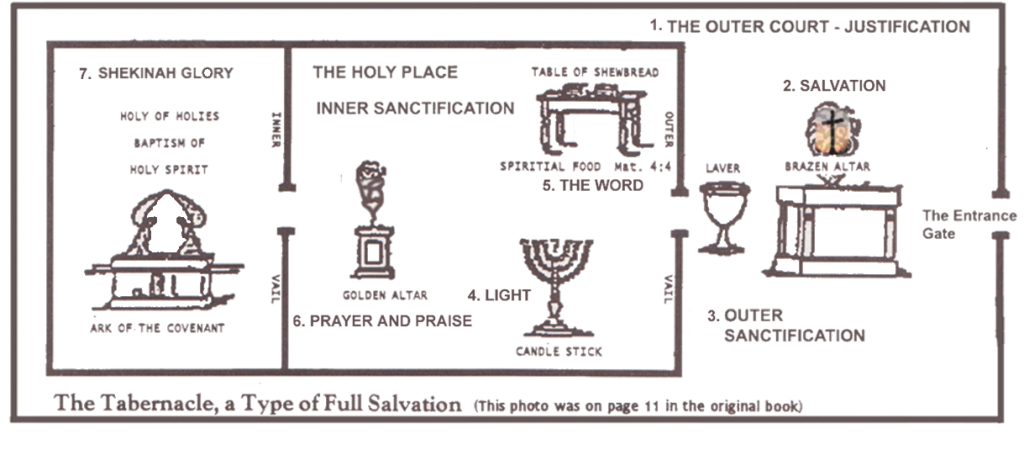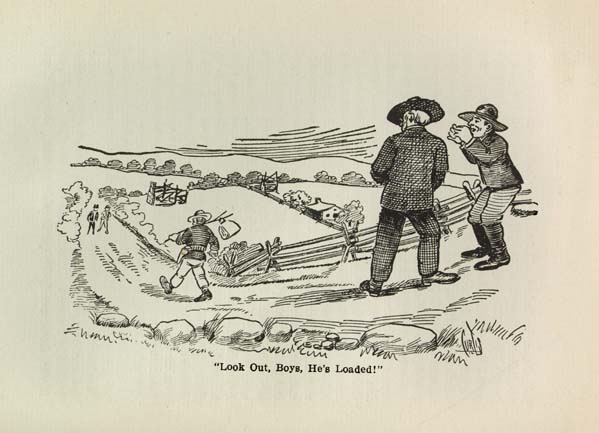As we drove home I did not have much to say, but I listened attentively to the conversation between my uncle and his wife. They were greatly impressed with the meeting, and they spoke first of this one and that one who had "come through" and what a change it would make in the community, as many of them were bad boys. As we were putting up the team my uncle spoke very encouragingly to me; he was delighted with the step I had taken and he pleaded with me not to turn back, but to press on until I found the pearl of great price. He knew my mother would be very happy over the start I had made. Before going to sleep I fell into a train of thought, though I was tired and exhausted. I wondered why I had gone to that altar and what I had gained by it. I felt no special conviction and had received no special impression, but then if my mother had started that way there must be something in it, for she always did what was right. I silently lifted my heart to God in prayer for conviction and guidance. I knew how to pray, for I had come up through prayer, but not the mourner's bench sort. So I determined to continue to attend the meeting and keep on going to the altar until I got religion.
Early the next morning I was up and in a serious frame of mind. I went with the other hands to the cottonfield and at noon I slipped off in the barn and prayed. But the more I thought of the way those young people were moved in the meeting and with what glad hearts they had shouted their praises to God the more it puzzled and confused me. I could not feel the conviction that they had and my heart did not feel melted and tender. I was callous and unmoved in feeling and my distress on account of sin was nothing like theirs. I did not understand my own state of mind and heart. It troubled me, for by this time I really wanted to have an experience like theirs.
When evening came I was ready for Church service and was glad to go. It required no urging. Another large crowd was present and the preacher was as earnest as ever. I did not give much heed to the sermon. In fact, I do not recall a word of it. I was anxious for him to conclude and give me a chance to go to the altar. I had gotten it into my head that there was some real virtue in the mourner's bench; and when the time came I was one of the first to prostrate myself before the altar in prayer. Many others did likewise. Two or three good people at intervals knelt by me and spoke encouragingly to me, but they did not help me. Their talks were mere exhortations to earnestness and faith, but there was no explanation of faith, neither was there any light thrown upon my mind and heart. I wrought myself up into tears and cries for help, but the whole situation was dark and I hardly knew why I cried, or what was the trouble with me. Now and then others would arise from the altar in an ecstasy of joy, but there was no joy for me. When the service closed I was discouraged and felt that maybe I was too hardhearted and the good Spirit could do nothing for me.
After we went home I tossed on the bed before going to sleep and wondered why God did not do for me what he had done for mother and what he was doing in that meeting for those young people at the altar. I could not understand it. But I resolved to keep on trying, and so dropped off to sleep. The next day I had about the same experience and at night saw no change in my condition. And so for several nights I repeated the same distressing experience. The meeting took on such interest that a day service was adopted along with the night exercises, and we attended that also. And one morning while I bowed at the altar in a very disturbed state of mind Brother Tyson, a good local preacher and the father of Rev. J. F. Tyson, now of the Central Conference, sat down by me and, putting his hand on my shoulder, said to me: "Now I want you to sit up awhile and let's talk this matter over quietly. I am sure that you are in earnest, for you have been coming to this altar night after night for several days. I want to ask you a few simple questions." And the following questions were asked and answered:
"My son, do you not love God?"
"I cannot remember when I did not love him."
"Do you believe on his Son, Jesus Christ?"
"I have always believed on Christ. My mother taught me that from my earliest recollection."
"Do you accept him as your Savior?"
"I certainly do, and have always done so."
"Can you think of any sin that is between you and the Savior?"
"No, sir; for I have never committed any bad sins."
"Do you love everybody?"
"Well, I love nearly everybody, but I have no ill-will toward any one. An old man did me a wrong not long ago and I acted ugly toward him, but I do not care to injure him."
"Can you forgive him?"
"Yes, if he wanted me to."
"But, down in your heart, can you wish him well?"
"Yes, sir; I can do that."
"Well, now let me say to you that if you love God, if you accept Jesus Christ as your Savior from sin and if you love your fellowmen and intend by God's help to lead a religious life, that's all there is to religion. In fact, that is all I know about it."
Then he repeated several passages of Scriptures to me proving his assertions. I thought a moment and said to him: "But I do not feel like these young people who have been getting religion night after night. I cannot get happy like them. I do not feel like shouting."
The good man looked at me and smiled and said: "Ah, that's your trouble. You have been trying to feel like them. Now you are not them; you are yourself. You have your own quiet disposition and you are not turned like them. They are excitable and blustery like they are. They give way to their feelings. That's all right, but feeling is not religion. Religion is faith and life. If you have violent feeling with it, all good and well, but if you have faith and not much feeling, why the feeling will take care of itself. To love God and accept Jesus Christ as your Savior, turning away from all sin, and living a godly life, is the substance of true religion."
That was new to me, yet it had been my state of mind from childhood. For I remembered that away back in my early life, when the old preacher held services in my grandmother's house one day and opened the door of the Church, I went forward and gave him my hand. He was to receive me into full membership at the end of six months' probation, but he let it pass out of his mind and failed to attend to it.
As I sat there that morning listening to the earnest exhortation of the good man my tears ceased, my distress left me, light broke in upon my mind, my heart grew joyous, and before I knew just what I was doing I was going all around shaking hands with everybody, and my confusion and darkness disappeared and a great burden rolled off my spirit. I felt exactly like I did when I was a little boy around my mother's knee when she told of Jesus and God and Heaven. It made my heart thrill then, and the same old experience returned to me in that old country Church that beautiful September morning down in old North Georgia.
I at once gave my name to the preacher for membership in the Church, and the following Sunday morning, along with many others, he received me into full membership in the Methodist Episcopal Church, South. It was one of the most delightful days in my recollection. It was the third Sunday in September, 1866, and those Church vows became a living principle in my heart and life. During these forty-five long years, with their alternations of sunshine and shadow, daylight and darkness, success and failure, rejoicing and weeping, fears within and fightings without, I have never ceased to thank God for that autumnal day in the long ago when my name was registered in the Lamb's Book of Life.



